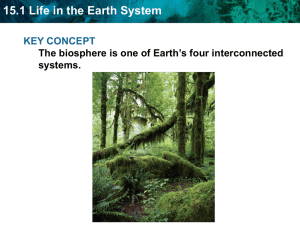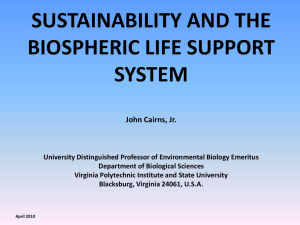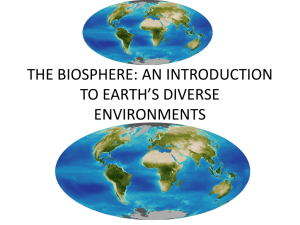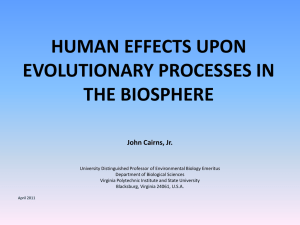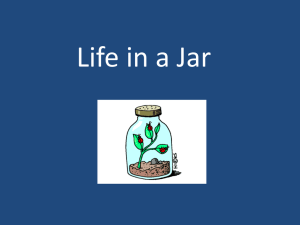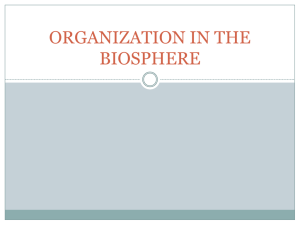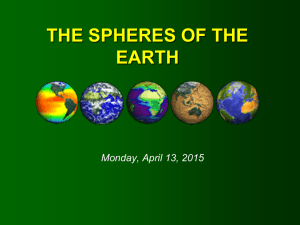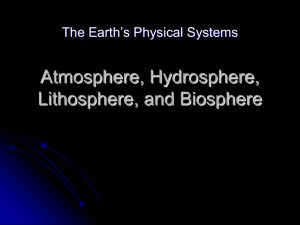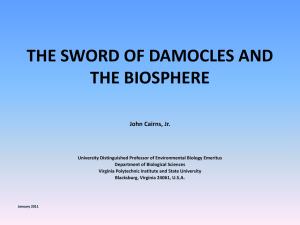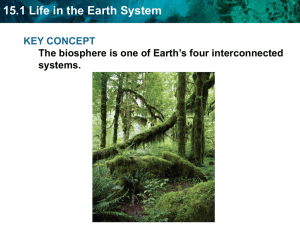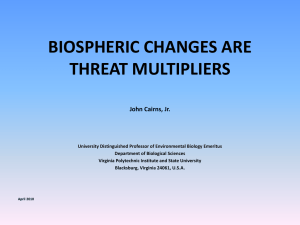Dumb Growth and the Biosphere
advertisement
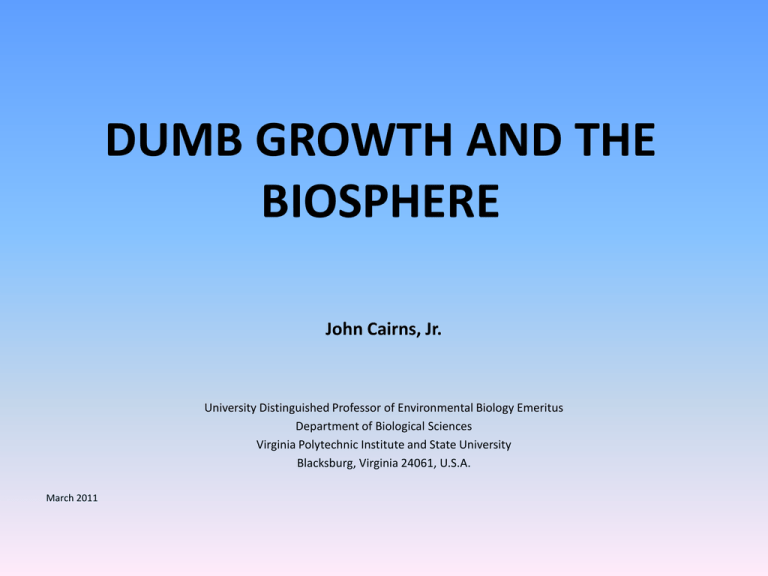
DUMB GROWTH AND THE BIOSPHERE John Cairns, Jr. University Distinguished Professor of Environmental Biology Emeritus Department of Biological Sciences Virginia Polytechnic Institute and State University Blacksburg, Virginia 24061, U.S.A. March 2011 DUMB GROWTH IS ANY GROWTH THAT IS UNSUSTAINABLE ON A FINITE PLANET. Growth in wisdom and knowledge are sustainable on a finite planet. Growth in population and consumption of finite resources (such as fossil fuel energy) are not sustainable. Dumb growth has already damaged the biospheric life support system and is difficult to eradicate. Dumb growth requires that financial and ecological debt be passed on to future generations. Continuing dumb growth is probable if it is re-labeled smart growth or sustainable growth. GROWTH: ECONOMIC GROWTH THAT CONSCIOUSLY SEEKS TO AVOID WASTEFULNESS AND DAMAGE TO THE ENVIRONMENT AND COMMUNITIES (http://www.bing.com). This definition sounds plausible until one realizes that finding any form of economic growth that does not damage the biospheric life support system is nearly impossible. All human economic growth is based upon natural capital and ecosystem services, which human activities are continually damaging. AN “ACID TEST” FOR SMART GROWTH WOULD BE TO ACHIEVE ECONOMIC GROWTH WHILE REDUCING ECOLOGICAL OVERSHOOT. Using more natural resources than the Biosphere can regenerate (ecological overshoot) is dumb growth since it is unsustainable. Proponents of smart growth should provide some examples of their success cases – preferably over a multi-decade time span. A CURRENT BUZZ WORD FOR SMART GROWTH IS LIVABLE COMMUNITIES. Livable communities offer any service an individual may need – stores, schools, physicians.1 Many people in the current, older generations grew up in such communities, but exponential population growth plus cheap fuel for automobiles has changed these communities. Humankind must be prepared to face a future with less energy and fuel per capita and stop using terminology (such as smart growth) that obscures the challenges that must be faced. EXPONENTIAL HUMAN POPULATION GROWTH ON A FINITE PLANET IS THE ULTIMATE IN DUMB GROWTH. With nearly 7 billion people on the planet, adding to the population means even more people living in misery. The gap between the very wealthy and the very poor has increased dramatically in the 21st century. Population growth is particularly devastating with the ecological overshoot now at 150%. Population stability within Earth’s carrying capacity simply has not occurred. The universal laws of physics, chemistry, and biology reduce population size of other species that exceed carrying capacity, but at a frightful cost in lives. ALL EIGHT INTERACTIVE GLOBAL CRISES (human economy, climate change, exponential human population growth, ecological overshoot, biotic impoverishment and reduction of biodiversity, renewable resources depletion, energy allocation, and environmental refugees)2 ARE AFFECTED BY DUMB GROWTH, WHICH IS ITSELF THE RESULT OF BELIEVING THAT GROWTH HAS NO LIMITS. For example, further rises in already high food prices will take the world into uncharted territory in the relationship between food prices and political stability. 3 The interactions between this global resource crisis (food scarcity) and the other seven global crises are not difficult to realize, but they will be difficult to synthesize because of the many interactive cause-effect pathways in the Biosphere. When synthesis in the science has occurred, the more difficult synthesis in policy making will still remain. ECONOMIC GROWTH THAT OCCURS WITHOUT SERIOUS CONSIDERATION OF ITS EFFECT ON THESE EIGHT GLOBAL CRISES IS, IN FACT, DUMB GROWTH. The 20th century was an era of specialization in which synthesis of the structure and function of interactive systems was not a “hot item.” In the 21st century, humankind is experiencing the unfortunate consequences of not paying serious attention to these transdisciplinary, complex, multivariate systems. The best information about these complex systems is provided by science that, regrettably, is under vigorous assault by individuals and special interest groups that feel threatened by the information. Synthesis of complex information is a difficult, time consuming endeavor that is not facilitated by these non-constructive assaults. ULTIMATELY, THE PRESENT BIOSPHERE WILL BE DESTROYED BY “BUSINESS AS USUAL” AND REPLACED IN EVOLUTIONARY TIME BY A NEW BIOSPHERE. The new Biosphere is unlikely to be as nurturing to Homo sapiens as the present Biosphere is. The universal laws of nature must be given greater attention. Humans cannot alter or evade these laws. Legislation cannot make evidence disappear4 or overturn scientific evidence or the universal laws that have existed for billions of years. DUMB GROWTH, IF IT CONTINUES, WILL ELIMINATE THE PRESENT BIOSPHERE (NUMBER 6). SO THE QUESTION BECOMES: “CAN HUMANKIND ADJUST TO THE REPLACEMENT BIOSPHERE (NUMBER 7), WHICH WILL CONSIST OF PREDOMINATELY NEW SPECIES?” The transition from Biosphere 6 to Biosphere 7 will probably occur in evolutionary time as happened after the previous five great extinctions. The new Biosphere will not come with an “operating manual.” Its structure and function will be determined by natural laws. In view of the difficulties of adaptation to a new Biosphere, addressing the eight global crises2 that threaten the present Biosphere is the best idea. Acknowledgments. I am indebted to Darla Donald for transcribing the handwritten first draft of this Power Point and for preparing it for publication. References 1Goodyear, S. 2010. Transportation Secretary Ray La Hood talks about livable communities. Grist Online 27Oct http://www.grist.org/article/2010-10-27transportation-secretary-ray-lahood-talk-about-livable-communities. 2Cairns, J., Jr. 2010. Threats to the biosphere: eight interactive global crises. Journal of Cosmology 8:1906-1915. 3Brown, L. R. 2011. World one poor harvest away from chaos. Earth Policy Release 15Feb http://www.earth-policy.org/plan_b_updates/2011/update91. 4Gleick, P. 2011. Montana considers repealing reality in the interest of economic development. Huffington Post 17Feb http://www.huffingtonpost.com/peter-h-gleick/montana-considers-repeali_b_824378.html.
